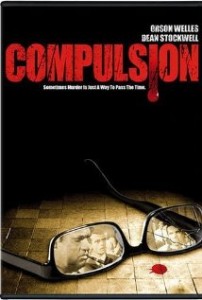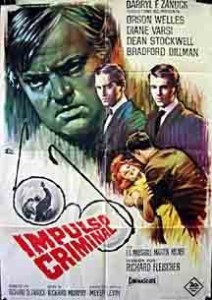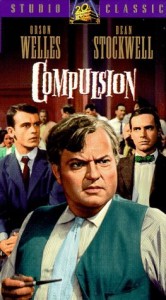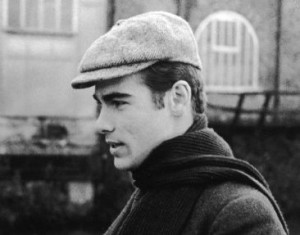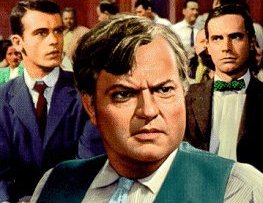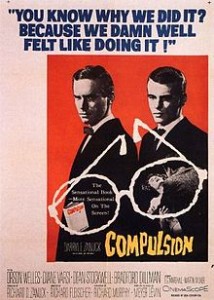Compulsion **** (1959, Dean Stockwell, Bradford Dillman, Orson Welles, E G Marshall) – Classic Movie Review 1,674
Richard Fleischer’s compulsive 1959 real-life thriller film Compulsion provides an engrossing and distinguished version of the deeply disturbing 1924 Chicago Leopold and Loeb murder case.
Director Richard Fleischer’s compulsive 1959 real-life thriller film Compulsion provides an engrossing and distinguished version of the deeply disturbing 1924 Chicago Leopold and Loeb murder case, which already been explored by Alfred Hitchcock in Rope and was to be used again in Tom Kaylin’s Swoon.
It’s a realistic and quite serious-minded, and liberal-minded reconstruction of events, marred only by question marks over the morality of being based on a novelised version of the truth and of being a torment to one of the killers trying to rehabilitate himself just out prison after 33 years, who tried to stop it being made.
In Compulsion, two wealthy Jewish University of Chicago law student friends – the forcefully evil Artie Strauss (Bradford Dillman) and the shy and sensitive Judd Steiner (Dean Stockwell) – kill for kicks in the same 1924 Chicago. After they kill a boy on their way home from school to commit the ‘perfect crime’, Strauss tries to cover it up, but they are caught when police find Steiner’s glasses at the scene of the crime.
Though the names are altered, Artie and Judd are still very much Nathan Freudenthal Leopold Jr and Richard Albert Loeb, who kidnapped and murdered 14-year-old Robert ‘Bobby’ Franks, motivated by their desire to commit a perfect crime. Leopold (November 19 1904 – August 29 1971) was still alive at the time of the film in 1959 but Loeb (June 11 1905 – January 28 1936) had died way back, horrifically slashed to death with a shaving blade by a former cell-mate, James E Day.
Stars Stockwell, Dillman and Orson Welles enjoyed the honour of sharing the Best Actor award at the Cannes Film Festival in 1959. Welles’s expectedly extravagant performance as famed attorney Jonathan Wilk (aka Clarence Darrow), the young men’s theatrically inclined counsel for the defence hired by the men’s parents, is a guaranteed eye-catching tour-de-force. Welles gets top billing even though he does not appear in the 103-minute film’s first hour.
Darrow’s passionate 12-hour ‘masterful plea’ to save the men’s lives from hanging at the sentencing hearing is the highlight speech of the great lawyer’s career. Its main targets are the American justice system’s inhumane methods and punishments, especially capital punishment. There’s no doubt Welles does full justice to it.
But the less showy E G Marshall also still gets to shine as the prosecutor in a powerful performance as the District Attorney Harold Horn who’s determined to unmask the ‘powder poofs’. Stockwell is particularly effective as the introverted genius under the spell of the magnetic but shallow Artie.
Director Fleischer turns in a polished, thought-provoking courtroom thriller bristling with tension, based on an admirable, literate screenplay by Richard Murphy. That in turn is taken from a novelised version of the actual true story by Meyer Levin, a University of Chicago classmate of Leopold. Leopold, who refused to co-operate with him in telling his story in novelised form, wrote that reading the novel made him physically sick.
‘More than once I had to lay the book down and wait for the nausea to subside,’ Leopold said. ‘I felt as I suppose a man would feel if he were exposed stark-naked under a strong spotlight before a large audience.’ In 1959 he sought unsuccessfully to block production of the film on grounds of invasion of privacy, defamation and profiting from his life story.’ Leopold was finally released in 1958.
It’s the first of Fleischer’s distinguished trilogy about real life notorious murders, followed by The Boston Strangler (1968) and 10 Rillington Place (1971). It’s the first film produced by Richard D Zanuck.
William C Mellor’s black and white widescreen format cinematography is impeccable.
When 1992 brought a new movie on the subject, Swoon, it was a very different story. The case continues to fascinate people and it also served as inspiration for Michael Haneke’s 1997 film Funny Games (and his American shot-for-shot remake Funny Games in 2008) and Barbet Schroeder’s Murder by Numbers (2002).
Dean Stockwell (born March 5, 1936) enjoyed a prolific career spanning more than 70 years. He died of natural causes at his home in Ranchos de Taos, New Mexico, on November 7, 2021, aged 85.
http://derekwinnert.com/swoon-1992-daniel-schlachet-craig-chester-classic-movie-review-1526/
http://derekwinnert.com/rope-classic-film-review-428/
© Derek Winnert 2014 Classic Movie Review 1,674
Check out more reviews on http://derekwinnert.com/

